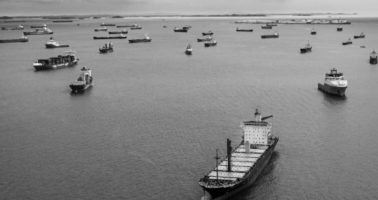In 2018, the International Maritime Organization (IMO) received broad support when it announced a landmark strategy to reduce emissions from shipping. It outlined a plan to reduce emissions intensity by at least 40% compared to 2008 levels by 2030, and by at least 70% by 2050, as well as to reduce total emissions by 50% for 2050, thereby ensuring that the international shipping industry plays its role in helping to achieve the goals of the Paris Agreement.
IMO is working to reduce emissions from shipping at a time when greenhouse gas emissions are increasing. The IMO's fourth study on greenhouse gases, released in August 2020, predicts that emissions could increase by as much as 130 percent by 2050, compared to 2008 levels.
Drastic and swift action is required. IMO introduced new shipping standards in early 2020 requiring the use of lower sulfur fuels for shipping and efforts are underway to implement new efficiency standards. However, despite the positive orientation of these measures, they do not by themselves contribute to meeting the targets for reducing greenhouse gas emissions. The ships that are used, the fuels that feed them and the associated infrastructure must begin to change.
Trafigura proposes that the IMO introduce a "partial feebate" system - a self-financing system - where, when a fuel is used that has a carbon dioxide equivalent (CO2e) intensity higher than an agreed reference level, it will be charged a levy, and when a fuel is used that has a CO2e profile below the reference level, a subsidy is provided.
To change the industry and achieve this evolution, the world's governments, shipowners and charterers must urgently work with IMO to agree on and implement a carbon tax.
and subsidize the use of low and zero carbon alternatives. In addition to subsidizing zero- or low-carbon fuels, the proceeds from this levy could be used in part to fund more research and development of alternative fuels. Revenues should in part be used to help small island developing States and other developing countries manage energy
transition processes and help them mitigate the consequences of climate change. As one of the world's largest ship charterers, responsible for more than 4,000 voyages each year, we recognize that a carbon tax will have an immediate effect on the transportation costs that companies - including ours - would bear. This increase in operating costs will prompt charterers to change their behavior to reduce emissions, charter more efficient vessels and switch to lower carbon fuels.
In recent years, great efforts have been made through the World Maritime Forum, the Getting to Zero Coalition and other initiatives to raise awareness, develop solutions and catalyze a modern maritime sector to take responsibility for its climate impact.
The time has come to put a price on carbon emissions in the shipping industry in the form of a mandatory global industry tax.

